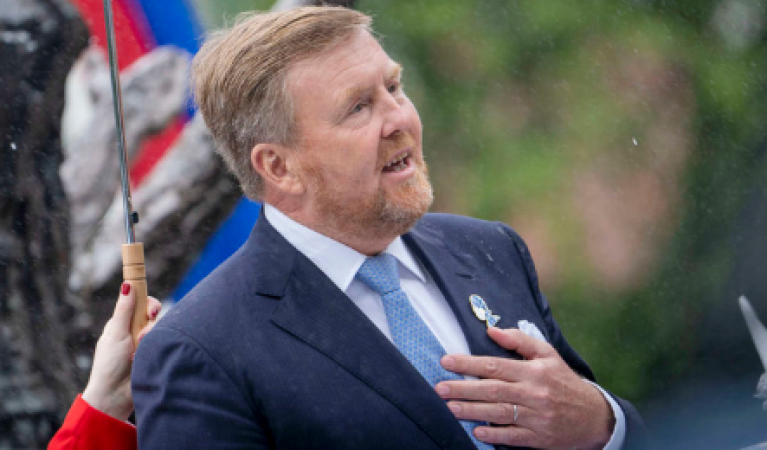
Amsterdam: At a ceremony to mark the anniversary of the abolition of slavery in Dutch colonies, King Willem-Alexander of the Netherlands made a historic speech in which he asked for forgiveness and apologised for his nation's involvement in slavery. The audience applauded and whooped in response.
Following Dutch Prime Minister Mark Rutte's apology for his nation's involvement in the slave trade and slavery late last year, the king delivered his speech. The public displays of regret are a part of a larger conversation about colonial histories in the West that the Black Lives Matter movement has recently sparked.
"Today, I stand before you," Willem-Alexander told the audience of invited guests and onlookers in his moving speech, referencing the prime minister's apology. I personally apologise today in my capacity as your king and a representative of the executive branch. My heart and soul are burdened by the words, too.
Also Read: Rev Up the Thrills: Polaris Sportsman vs. Yamaha YFM Raptor – Battle of the All-Terrain Titans
The king claimed to have ordered a study into the precise part played by the Orange-Nassau royal family in the practise of slavery in the Netherlands.
"But today, on this day of remembrance, I ask forgiveness for the clear failure to act in the face of this crime against humanity," he continued.
After finishing his speech and placing a wreath at the country's national slavery monument in an Amsterdam park, Willem-Alexander's voice seemed to break with emotion.
Some people prefer deeds to speak for themselves.
"To be completely honest, I feel great, but I still want more than just excuses. For instance, reparations," the 28-year-old Doelja Refos said.
"I don't think we're done yet. Refos continued, "We're definitely not there yet.
In response to the king's apology, former lawmaker John Leerdam told Dutch broadcaster NOS that he began to cry. We must acknowledge that this is a historic moment, he said.
Also Read: Russia's Foreign Debt Hits Multi-Year Lows, Boosting Economic Stability
On July 1, 1863, slavery was abolished in Suriname and the Dutch Caribbean colonies, but the majority of the slave labourers were compelled to work on plantations for an additional ten years. A year of celebrations to mark the 150th anniversary began with the speech and memorial service on Saturday.
According to research released last month, the king's ancestors profited from shares that were effectively given to them as gifts, earning the modern-day equivalent of 545 million euros ($595 million) from slavery.
When Rutte apologised in December, he refrained from compensating those who were enslaved as children.
Instead, to address the legacy of slavery in the Netherlands and its former colonies and to enhance education on the subject, the government is establishing a 200 million euro ($217 million) fund.
Some Dutch people feel that is not enough. Before the king's speech on Saturday, two organizations—Black Manifesto and The Black Archives—organized a protest march under the theme "No healing without reparations."
There are many people who believe that an apology is insufficient, including my group, The Black Archives, and the Black Manifesto. Black Archives director Mitchell Esajas stated that an apology "should be tied to a form of repair and reparatory justice or reparations."
In a celebration of the abolition of slavery in Suriname, marchers wore vibrant traditional clothing. According to the organisers, people who were enslaved were not permitted to wear shoes or bright clothing.
On this day, we remember our ancestors, but we also feel free, can dress however we want, and can demonstrate our freedom to the rest of the world. 72-year-old Regina Benescia-van Windt said.
The killing of Black man George Floyd in the US city of Minneapolis on May 25, 2020, and the Black Lives Matter movement have renewed and intensified criticism of the Netherlands' frequently brutal colonial past.
The national museum of art and history's ground-breaking 2021 exhibition took a harrowing look at slavery in Dutch colonies. A report from the same year called Dutch complicity in slavery a crime against humanity and connected it to what it called enduring institutional racism in the Netherlands.
In the late 1500s, the Dutch first got involved in the transatlantic slave trade, and by the mid-1600s, they were a significant player. According to Karwan Fatah-Black, an expert in Dutch colonial history and an assistant professor at Leiden University, the Dutch West India Company eventually rose to become the largest trans-Atlantic slave trader.
The Dutch government is not the only one to apologise for past wrongdoings.
Denmark, which colonised Ghana from the middle of the 17th century to the middle of the 19th century, apologised to Ghana in 2018. Belgian King Philippe has expressed his "deepest regrets" for the wrongdoing in the Congo. Pope John Paul II issued an apology for the church's complicity in slavery in 1992. Americans have engaged in emotionally charged arguments over removing slaveholders' statues from the South.
A document that showed an ancestor owning stock in a slave-trading company prompted King Charles III to publicly support research into the British monarchy's connections to slavery for the first time in April, according to a spokesperson for Buckingham Palace.
Also Read: Computer games' are to blame for the riots, according to Macron
Although they have expressed their sorrow over slavery, Charles and his eldest son, Prince William, have not mentioned the crown's ties to the trade.
Two years ago, at a ceremony to commemorate Barbados becoming a republic, Charles spoke of "the darkest days of our past and the appalling atrocity of slavery, which forever stains our history." African slaves were employed by English settlers to transform the island into a prosperous sugar colony.
Although he acknowledged that not everyone in the Netherlands is in favour of apologies, Willem-Alexander urged harmony.
He declared, "There is no manual for the process of healing, reconciliation, and recovery." "We are in uncharted territory together. So let's encourage and support one another.